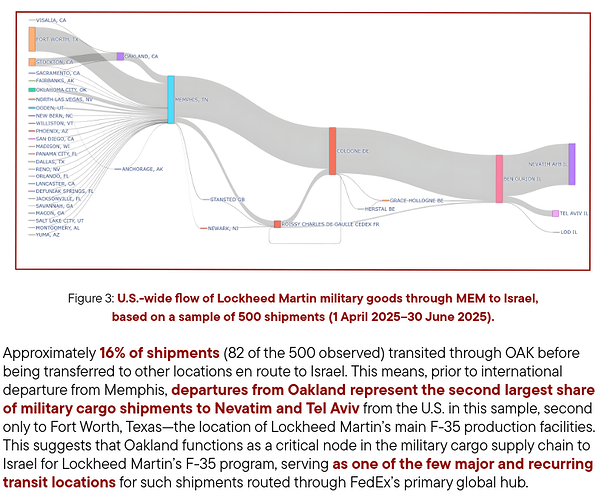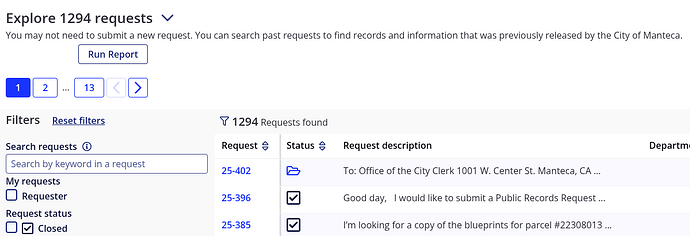Side Quest – BDS in the Central Valley
Goal
The goal is to support the Boycott, Divestment, and Sanctions (BDS) movement at the local and county level by leveraging public funds to punish corporations that continue to be involved with Israel.
Right now, we still need to plan this action out in more detail before voting.
Plan
We would do this through two avenues:
1) City and county divestment in San Joaquin County and Stanislaus County
- Push for legislation that would actively divest from corporations on the BDS list.
- First, through Public Records Act Requests (PRA), see which cities/counties have contracts and investments with entities on the BDS list.
- Second, if there are investments to be targeted, develop a BDS campaign at the city/county level.
2) Develop a campaign targeting the Port of Stockton
- First, reach out to the Arab Resource & Organizing Center (AROC) to see if they have information on ships coming in through the Port of Stockton. AROC
- The Port cannot pass legislation that would interfere with international commerce. So we are limited to a messaging resolution with them.
- Second, the Port of Stockton Commission has several local power players (David B. Atwater, Allen Sawyer, Anthony Barkett, and William R. Trezza). Commissioners
- Even though the campaign against the Port would be more messaging than material, it would be useful to raise people’s awareness of who these people are, what financial interests they have, how they move taxpayer dollars around, and in general what role they play in working class exploitation.
Examples of other cities
Hayward, California
-
Legislation:
- Adopt a Resolution Accepting the Fiscal Year 2024 Statement of Investment Policy and Delegation of Authority – Passed 4-3. Hayward Meeting Agenda Source
- Text: A motion was made by Council Member Syrop, seconded by Council Member Zermeño, to begin the process of removing the City’s holdings in four companies – Chevron, Caterpillar, Hyundai and Intel – and to adopt the City’s Investment Policy.
- Adopt a Resolution Accepting the Fiscal Year 2024 Statement of Investment Policy and Delegation of Authority – Passed 4-3. Hayward Meeting Agenda Source
-
Things we should PRA request from Hayward:
- We should backdate the PRA request to when they first started drafting the year’s budget. Maybe July 2023? Since the vote was January 2024.
- This is not a complete list but it would be good to see what the back-end discussion around how to divest actually went. We could use this to inform our own strategy.
- People: City Treasurer/Finance Director, City Manager and City Manager’s Office, City Attorney’s Office, City Clerk, any external investment advisor/manager, and City Council.
- All drafts, redlines, and final versions of investment policy and any subsequent amendments or guidance that was updated due to the divestment resolution. Includes staff reports, fiscal/operational impact analysis, slide decks, talking points, or powerpoints regarding divestment. This should include any discussions on selling now vs holding to maturity, expected costs, liquidity impacts, and legal constraints.
- All monthly investment holdings and compliance reports for all city portfolios, for each month going back to July 2023.
- Records that show the city’s exposure to corporate bonds and commercial paper by issuer around the time of divestment.
- Records describing the City’s use of pooled funds or cash vehicles (LAIF, CAMP, county pools, money market funds) and any analysis or correspondence about whether/how divestment applied to those.
- Any decisions to move assets in or out of such vehicles in connection with the divestment.
- Regarding the divestment: emails, memoranda, messages between listed people. Emails and messages between listed people and investment advisors/managers, custodian bank, brokers/dealers, or any representatives of Chevron, Caterpillar, Hyundai, Intel. Agenda packets, staff presentations, minutes, video/recordings, and all public comments related.
-
Additional references:
- Hayward City Council narrowly approves divesting $1.6M from companies with ties to Israel: https://eastbayecho.com/2024/01/24/hayward-city-council-narrowly-approves-divesting-1-6m-from-companies-with-ties-to-israel/
- How a California city stopped corporate complicity in Israel’s crimes: How a California city stopped corporate complicity in Israel's crimes | The Electronic Intifada
Richmond, California
- Richmond has a more comprehensive and forward-looking strategy. They updated their Investment Policy to incorporate a broad human rights screening, and prohibit investment into industries that facilitate violence, war, and apartheid.
- To avoid issues with AB 2844, the policy says that it “shall not allow any discriminatory actions against any person on the basis of religion, creed, ethnicity, national origin or any unlawful basis”.
- There are a lot of documents from Richmond that we need to go through:
- Resolution. Meeting Agenda Source
- Agenda Item (PDF): https://pub-richmond.escribemeetings.com/filestream.ashx?DocumentId=54967
- Proposed Changes to Investment Policy – more details in the PDF above:
- New Restriction 1: It is the City’s policy not to invest in a predetermined list of companies and their subsidiaries that are involved in Israel’s violations of Palestinian rights.
- New Restriction 2: It is the City’s policy not to invest in companies and their subsidiaries involved in the development and manufacturing of arms and weapons.
- New Restriction 3: It is the City’s policy not to invest in companies and their subsidiaries that are involved in the border and mass surveillance industries.
- New Restriction 4: It is the City’s policy not to invest in companies and their subsidiaries that are involved in the mass incarceration and detention industries, nor those companies that use prison labor to manufacture products.
- Proposed Changes to Investment Policy – more details in the PDF above:
- Attachment 1: Restricted Companies (PDF): https://pub-richmond.escribemeetings.com/filestream.ashx?DocumentId=54968
- Agenda Item (PDF): https://pub-richmond.escribemeetings.com/filestream.ashx?DocumentId=54967
- Presentation by City Staff (PPT): https://www.ci.richmond.ca.us/DocumentCenter/View/72699/W1---Investment-Policy-Update
- Resolution. Meeting Agenda Source
Portland, Maine and Iowa City, Iowa
-
Both also passed divestment resolutions. But the cities apparently were not directly holding any investments “in our general fund.”
- Maybe that is the case. Maybe the language in the resolution was off and allowed the City Manager to worm around having to do anything. Source: https://mainemorningstar.com/briefs/portland-mayor-apologizes-to-jewish-community-for-citys-divestment-vote/
- Portland’s resolution (PDF): https://media.wbur.org/wp/2024/09/Resolve-Calling-for-the-City-of-Portland-to-Divest-Any-and-All-Public-Monies-from-Entities-Complicit-in-the-Current-and-Ongoing-Humanitarian-Crisis-.pdf
- Iowa City had similar resolution language. Source: https://legistarweb-production.s3.amazonaws.com/uploads/attachment/pdf/3515627/Gaza_Resolution.pdf
-
Portland, Maine:
-
NOW, THEREFORE, BE IT RESOLVED, that the City Council urges that the City Manager divest the City of Portland from all entities complicit in the current and ongoing humanitarian crisis in Gaza and occupation of Palestine, including, without limitation, all entities on the Divestment List when it is feasible and carries no financial penalty to the City; and
-
BE IT FURTHER RESOLVED, regardless of current investments, that the City Council urges the City Manager to not make any future directly held general fund investment in any entities complicit in the humanitarian crisis in Gaza and occupation of Palestine, including, without limitation, the entities on the Divestment List or make any investments in the Israeli military in the form of Israel Bonds; and
-
BE IT FURTHER RESOLVED, that this resolve will remain in effect as long as the occupation of the Palestinian Territories and the violations of human rights and international law, such as those described above, continue.
-
-
Iowa City, Iowa:
-
NOW, THEREFORE, BE IT RESOLVED, that the City Council directs that the City Manager divert existing investments held by the City of Iowa City from all entities complicit in the current and ongoing humanitarian crisis in Gaza and occupation of Palestine, as identified by the American Friends Service Committee list of “Companies Profiting from the Gaza Genocide – Divestment Shortlist”[9], hereinafter referred to as the “Boycott List”; and
-
BE IT FURTHER RESOLVED, regardless of current investments, that the City Council directs the City Manager to not make any future directly-held general fund investment in the equities or bonds of any entities on the Boycott List or make any investments in the Israeli military in the form of Israel Bonds; and
-
BE IT FURTHER RESOLVED, that the City Council of Iowa City directs the City Manager to continue to investigate and report on investments made by the City of Iowa City annually to ensure the absence of investments in entities on the Boycott List; and
-
BE IT FURTHER RESOLVED, that this Resolution will remain in effect as long as the occupation of the Palestinian Territories and the violations of human rights and international law, such as those described above, continue, as determined by the City Council.
-
California AB 2844 (Chapter 581, Statutes of 2016)
- LegInfo Source: Bill Text - AB-2844 Public contracts: discrimination.
- California has anti-BDS legislation on the books. It was passed in 2016. Relevant for us, both Susan Eggman and Adam Gray voted for it.
- According to Palestine Legal, the legislation is limited in scope, although it seems like it is expansive if we are not careful about our proposed language. Source: FAQ: California's AB 2844 and the Right To Boycott — Palestine Legal
- While the author and sponsors say the legislation is to combat BDS, the legislation does not explicitly name the BDS campaign. Instead, it states that any “policy” you have against another nation is not used to discriminate in violation of California’s Unruh Civil Rights Act (Unruh) and Fair Employment and Housing Act (FEHA).
- We should look to Richmond, California for how to not get caught up in AB 2844. They took it into account when drafting their legislation. Source PPT: https://www.ci.richmond.ca.us/DocumentCenter/View/72699/W1---Investment-Policy-Update
Strategy
What we are divesting from
- Cities usually do not buy stocks in their operating/cash portfolios. Instead, they lend to companies via very safe debt and get interest plus principal at maturity. So we’re looking at corporate notes/bonds and commercial paper (very short-term corporate debt).
- Cities also have contracts with some of these companies that could be terminated.
How divestment would work
- Divestment with corporate bonds and commercial paper can work as follows:
- Identify exposures: the treasurer or the city’s external manager (or us) reviews portfolio holdings and finds any bonds or commercial paper issued by targeted companies.
- Ensure we sell now instead of holding to maturity:
- Selling now does immediate divestment, but we may get push back if the sale results in a loss (this depends on how interest rates have changed since the bond was purchased).
- The alternative is to let the debt mature and we stop buying new debt from the targeted companies. But this may be a prolonged 3–5 year process, and we should avoid it.
- There is the issue of pooled holdings, such as money market funds. The city can’t control what these funds invest in and the choice to move money to funds that are screened will likely incur higher costs that we will also get push back on.
- Update any investment policy we have that adds a list of issuers the city is prohibited from buying from.
- Instruct any external advisors or internal staff to implement these restrictions.
- Fiduciary constraints: By law and policy, the safety of principal and liquidity come before yield or social goals. In other words, divestment shouldn’t compromise the city’s needed liquidity. But I doubt there will be enough losses to do anything like that.
How divestment hurts companies
- I am just reading up on this, but we should have a clear explanation for the public.
- Divestment raises a company’s cost of capital and lowers its access to financing.
- If fewer investors buy a company’s new bonds or commercial paper, underwriters have to offer a higher yield (what the company pays out) to get investors to purchase it.
- Ultimately, debt costs do play a role in a company’s investment decisions and profitability. But the effect depends on scale and coordination - we’d need this to happen in a lot more cities.


